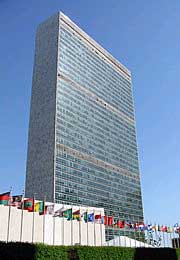 As conflict between the security forces and Maoist rebels intensifies in Nepal, the voice for peace is also getting stronger. Joining the peace chorus last week was UN Secretary General Kofi Annan, who not only called for the end of the conflict, but also offered help to mediate. The offer, however, has sparked a debate in Nepal about the whether the UN can, or should, play such a role.
As conflict between the security forces and Maoist rebels intensifies in Nepal, the voice for peace is also getting stronger. Joining the peace chorus last week was UN Secretary General Kofi Annan, who not only called for the end of the conflict, but also offered help to mediate. The offer, however, has sparked a debate in Nepal about the whether the UN can, or should, play such a role. Most of the political parties of the dissolved parliament have welcomed Annan's offer. They say it could be an opportunity to establish peace in the country. The UML's Jhalnath Khanal believes UN mediation has become crucial given the widening mistrust among the political forces in the country. "In such a situation, the UN can certainly play a positive role to bring the conflicting parties together for a ceasefire and peace talks."
India, China and the United States are all said to be against UN involvement. India, for instance, has argued that third party mediation would legitimise the rebel group. But some international affairs experts say UN involvement would actually forestall interference by regional or world powers in Nepal. "With two regional powers as our immediate neighbours, we need to make sure that no foreign power enters our country. That is why the world body would be the right mechanism for mediation," explains foreign policy analyst Hiranya Lal Shrestha.
Others disagree, saying the UN's own charter doesn't allow mediation. "The UN's Security Council Proposal 1373 has clearly stated that the violent activities of the rebels is terrorism, by that definition the rebels are terrorists," says Nepali Congress leader Ram Sharan Mahat. "With such provision in its own proposal, how the UN will be able to mediate in a conflict that has one of the party as terrorists, I don't understand."
Another provision, Article 2 (7), of the UN charter also states that the world body will not take part in the domestic affairs of a country as long as it does not become an international security threat. "Since the Maoist insurgency is not yet recognised as international security threat, the UN cannot mediate because the problem still remains Nepal's internal matter," argues former Upper House member Dipta Prakash Shah.
With such divisive interpretations of its charter, how can the UN help? Annan's statement released last week does not carry details, but the UN's resident coordinator in Nepal, Matthew Kahane, says the help could range from building trust in both the sides to facilitating a resumption of the peace process. "There can be so many ways, but it is often done in low key as we did in Namibia, Cambodia and Guatemala, among others," Kahane says.
For whatever kind of help, the UN would require both the parties in the conflict to make a formal request for its mediation. The Maoists have always voiced a need for the UN's presence for different options ranging from peace talks to constituent assembly elections and even to demobilisation of the military force of both the sides.
The government, however, believes that Nepal has not yet exhausted its internal means to deal with the insurgency. In response to Annan's latest offer, Home Minister Kamal Thapa had this to say: The government is examining the pros and cons of such an offer, we will soon decide about it." (Navin Singh Khadka)


